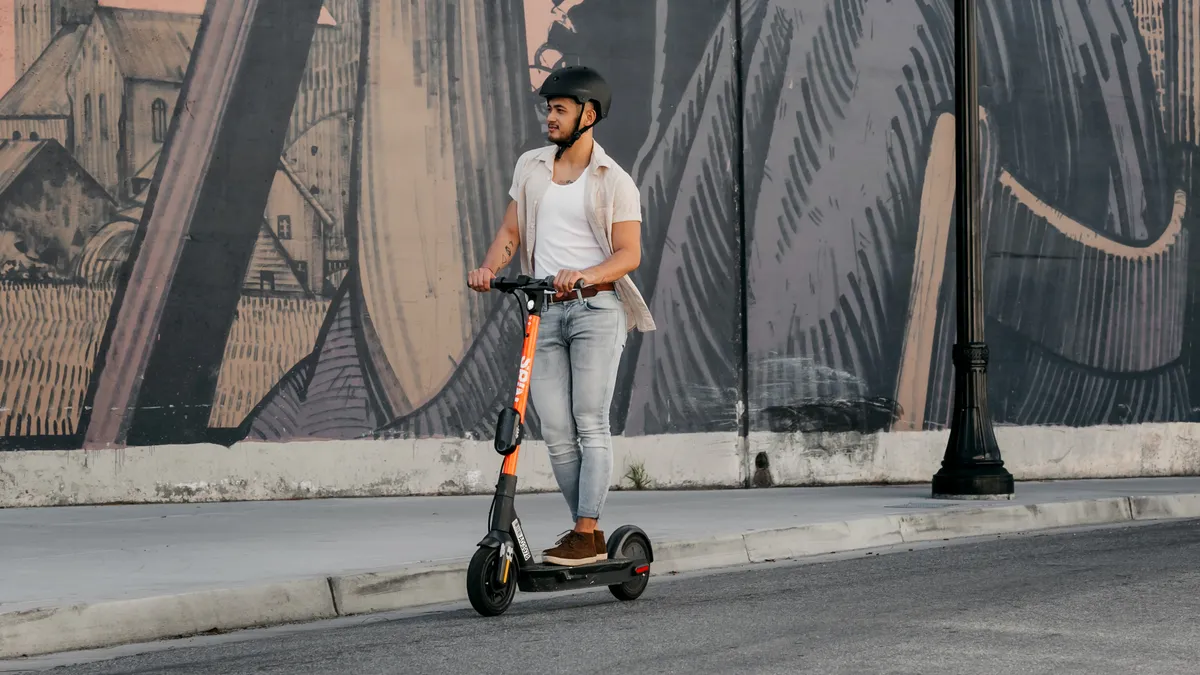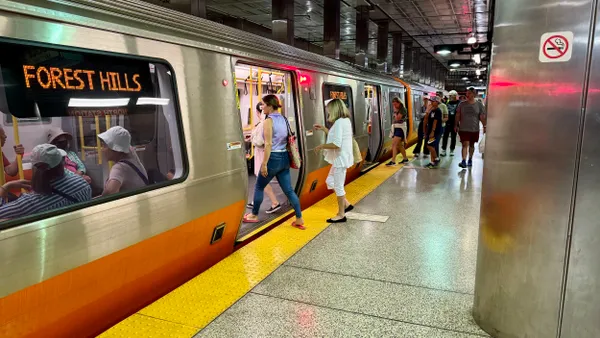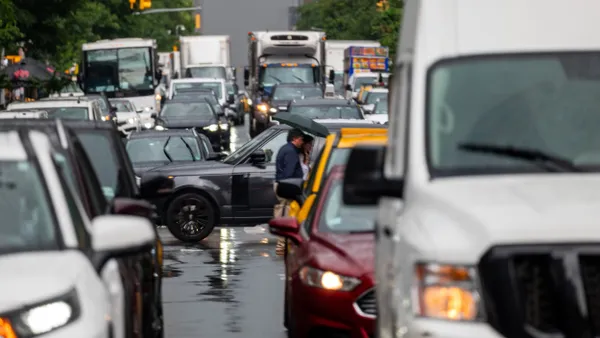Dive Brief:
- Despite a drop in total e-scooter ridership between Chicago's 2019 and 2020 pilot programs, city residents continue to show potential interest in the micromobility option, according to a city report on the four-month 2020 pilot.
- The pilot, which ran from August through December, had 540,000 total trips on a maximum fleet of 10,000 vehicles. That translated to an average of 0.59 trips per scooter per day, with an average trip length of 2.1 miles.
- The 2020 pilot also had an emphasis on equity, requiring operators have 50% of their vehicles available in an "equity priority area" on the city’s south and west sides. Although 90% of the area was within a five-minute walk of a scooter, on average, only 23% of scooter trips in the pilot originated there.
Dive Insight:
The 2020 e-scooter pilot built on the Chicago Department of Transportation's (CDOT) first pilot in 2019, when it allowed 10 micromobility operators to deploy scooters in a 50-square-mile portion of the city. For its second pilot, it limited participation to three vendors — Bird, Lime and Spin — that could each deploy up to 3,333 scooters in a larger geographic zone, although certain areas were still off-limits.
Hampering the 2020 pilot were the effects of the pandemic, which limited tourism and social activity, and the pilot was also run during the colder fall and winter months. Those factors make it hard to draw firm conclusions, experts said, although the pilot did show that there is some interest in bringing scooters to the city.
"Even in a strange year … the average trip length was longer that you’d normally see in cities that have done similar pilots," said Colin Murphy, director of research and consulting for the Chicago-based Shared-Use Mobility Center. "There were some things that were encouraging and suggest that people are using scooters to get where they need to go, rather than just trying it out here and there."
The top three trip purposes during the pilot were "visiting friends/relatives," "riding around having fun" and "attending recreational activities." In contrast, "routine shopping," "going to or from the workplace" and "routine shopping" were ranked as the three least common trip purposes.
Eighty-eight percent of e-scooter riders said they thought scooters should be part of Chicago’s transportation system, according to a pilot survey, while 65% of nonriders said they should not. Ninety percent of riders said a scooter made it easier for them to reach a destination or complete a trip, with most using scooters to replace a biking or walking trip.
The city also received fewer complaints about the devices in 2020 compared with 2019: It recorded 75% fewer 311 reports when factoring in the increased number of devices.
Equity was a focal point of the city's second pilot. Although the pilot's equity priority area was 45% of the pilot area and about 45% of its population, less than a quarter of all trips started there. While 60% of all trips originated in just eight of the city’s 77 community areas, and nearly half of those were in the Lake View and Lincoln Park neighborhoods, those two neighborhoods were only 2.9% of the total pilot area.
Compared with the overall population, the scooter riders were 1.7 times more likely to identify as White than average and were almost twice as likely to be in the 25-34 age group. Those figures show there is still work to be done to increase equity for micromobility offerings, according to Samuel Kling, Chicago Council on Global Affairs global cities fellow.
"Within that zone, there are barriers in place just to getting on a scooter and riding around. People have longer trips to work, the streets have potholes, they may be worried about safety," Kling said. "But it’s also important to note that even though the city made scooters available in that zone, there were no requirements that they actually be affordable."
Kling pointed out that with an average trip length within the priority zone of 28 minutes, a scooter ride priced at 19 cents per minute and a $1 start fee would cost $6.32, more than a bus or train ticket. In a 2020 report, Chicago Council on Global Affairs wrote that the city’s e-scooter program needed to be extended to downtown areas and other transportation corridors with policies that prioritized equity and affordable access.
In a statement, CDOT Commissioner Gia Biagi said Chicago is "committed to providing equitable, accessible, affordable and sustainable transportation options for all of our residents and visitors," and that CDOT would work with the City Council on future micromobility programs. Howard B. Brookins, 21st ward alderman and chair of the city council's Transportation & Public Way Committee, said he would schedule a hearing to discuss the pilot results, adding that "any authorization of e-scooters needs to be through an accountable and well-managed program that ensures that they benefit all Chicagoans."
Correction: This story has been updated to reflect the correct cost of an average scooter trip price and length within the city's priority zone.










